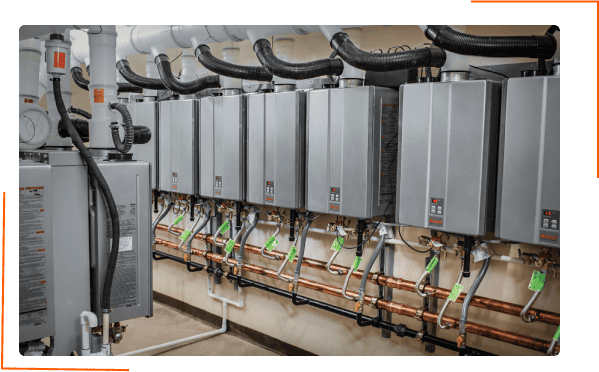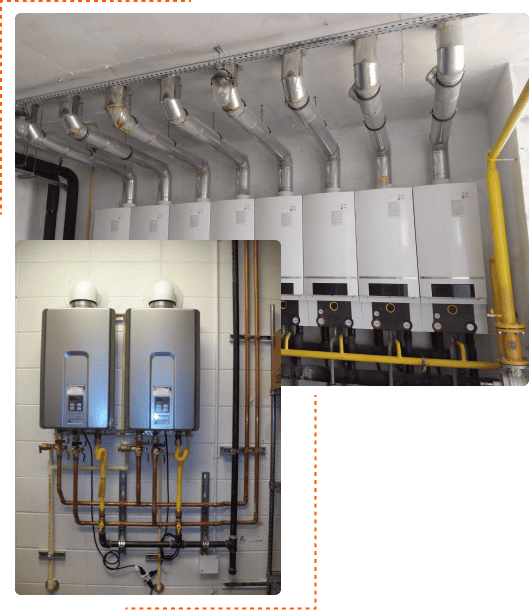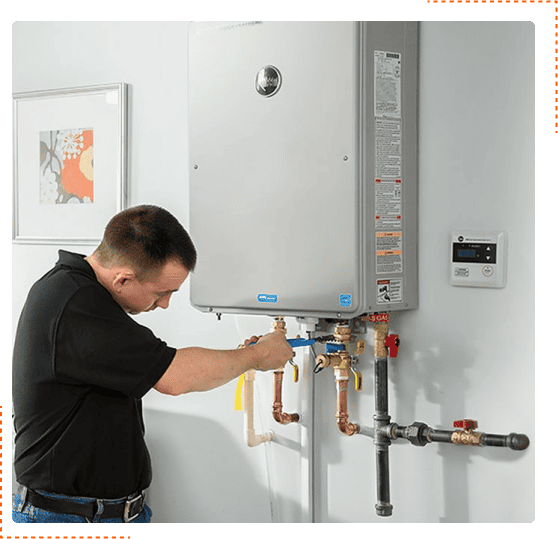About Water Heaters

Request Service
Enter Your Correct Detail Here
To Help You Better And Fast

(916) 999 - HEAT

Enter Your Correct Detail Here
To Help You Better And Fast





Water heaters, often located in a basement or utility room, are the unsung heroes of the house. They make it possible to perform things like washing dishes and clothing and taking showers. Thus, it is unsurprising that water heaters account for 18% of a typical home’s total energy use, placing them among the top three energy hogs.
Having constant access to hot water is essential to our everyday life. The typical American household consumes between 80 and 120 gallons of hot water each day, at a yearly cost of around $267. Edwin Ruud, a Norwegian mechanical engineer based in Philadelphia, is widely credited as the creator of the contemporary tankless water heater. In 1889, he came up with “the first automated, storage-tank type gas water heater.” In 1897, Ruud received a patent for his innovation, and the following year, he co-founded a corporation with six other engineers.
These conventional heaters are still frequently used by families throughout the nation. The insulated tank in these units may contain as much as eighty gallons of liquid. These multi-fuel appliances are helpful since they can be run on any combination of electricity, gas, propane, or fuel oil.
These systems, sometimes known as on-demand water heaters, employ heating coils to provide hot water on demand, eliminating the need for a separate storage tank. Due to their capacity to only heat water when it's being used, tankless water heaters may drastically reduce your yearly energy bill.
The hybrid water heater combines the energy efficiency of tankless heaters with the bigger storage capacity of storage tanks. These units include a tank for storing water and a heat pump that sits above the water heater to provide extra heating. An electrical system controls the pump that brings colder outside air and channels it into the insulated tank for storage.
A solar water heater requires a few components to harness the sun's energy and heat your drinking water. A solar energy collector mounted on the roof is required for water heating. Water heated by the panel travels via a heat exchanger before entering your home's plumbing system. It is common practice to include storage tanks in the system to make the most of the energy produced. Technicians will create a one-of-a-kind setup for your specific requirements.
Tankless water heaters and solar thermal panels provide a very efficient hot water system. Suppose you have a solar thermal system that doesn't produce enough hot water. Don't worry; the tankless heater will only consume as much energy as is needed to meet your precise needs.
In terms of functionality and installation, high-efficiency condensing gas tank water heaters are identical to their regular gas storage water heater counterparts. The hot water is stored in a tank and heated by the water heater. Cold water is added to the tank to replace the hot water used. The electronic controllers constantly monitor the tank's temperature, which will reheat the water if required.
High-efficiency condensing gas tank water heaters are different from standard gas water heaters in that they are designed to transmit and store more heat in the water efficiently. As a result, less energy is spent on heating.

Each unit’s thermostat monitors the tank’s water temperature and activates the heater when the temperature drops below a user-defined threshold. There are pressure release valves on the tank in case the water becomes too hot and air pressure builds up.
Having a large storage tank means you may almost always have access to hot water since these heaters always maintain ideal water temperatures. However, if you use a lot of hot water, a smaller tank may run out of heated water rapidly, forcing you to wait until the next supply can be heated. Compared to other water heaters, these equipment are always running, resulting in higher energy consumption.
Conventional storage tanks may vary from $300 to $2,000 for 40- and 75-gallon sizes, with smaller sizes costing less. On average, gas water heaters cost less to run than electric ones, but they also cost more to buy and insta
These heaters may be either natural-gas or electricity-powered. In reality, the former is far more prevalent since it provides a more consistent and substantial supply of hot water.
There may need to be more than a single tankless water heater for a family that regularly uses hot water. If you want to wash the dishes while also having a shower, you may quickly run out of hot water. These machines transfer around two to five gallons of hot water each minute.
Price
Tankless water heaters may be purchased for $900–$1500, with installation costing another $400–$500. You can get electric versions for around $500-$700, but you may need to expand your home’s electrical capacity to use them securely. Gas units are more expensive, often running between $1,000 and $1,500, and also need the installation of a safe ventilation device. Gas furnaces and air conditioners need more frequent servicing, but they’re cheaper to operate in the long term.
These units include a tank for storing water and a heat pump that sits above the water heater to provide extra heating. An electrical system controls the pump that brings in colder outside air and channels it into the insulated tank for storage.
Water is heated 60% more efficiently than in typical storage tanks, resulting in much cheaper energy expenses, like an air conditioner in reverse. Hybrid water heaters are often higher than standard appliances because the water pump requires an extra 7 feet of vertical space. They’re not going to perform as well in chilly or confined conditions.
These water heaters may be purchased for $1,200 to $1,500, with an additional $500 needed for installation. Despite the initial investment, units may reduce yearly energy costs by $330 for the typical American home.

You can get your money's worth out of a solar water heater within a few years, thanks to the money you'll save on your energy bills. This will slash a family's electrical water heating bill in half. Water heating expenses might be cut by as much as 90% in sunny states like California.
A solar water heater uses the sun's plentiful and cost-free energy to heat water for residential use. If you can, use solar water heating instead of an electric or gas water heater to lessen your environmental impact. You will not only save the environment while reducing your monthly utility bills.
Directly heating water with the sun's beams is more efficient than converting sunlight into energy and then utilizing that energy to heat water.

The exhaust gases from the home’s natural gas system may be utilized to heat water in a condensing water heater. Hot byproduct gas from a furnace’s combustion of natural gas is directed into a coil at the bottom of a water heater tank, which is used to warm the water within.
These systems, which run on waste gas, work best in conjunction with natural gas stoves and water heaters. Condensing water heaters are very efficient and cost-effective since they use waste gas as fuel rather than electricity or natural gas. These systems are more expensive than standard tank water heaters but are often only available in large quantities.
Non-condensing boilers lose heat that may be recovered via stainless steel heat exchangers. Less money must be spent on venting materials like Schedule 40 PVC because of reduced CO2 emissions and exhaust temperatures.
Different types of water heaters have different lifespans, but one thing remains true: regular maintenance by a licensed plumber will extend the life of any water heater.
The average lifetime of a tankless water heater is 20 years. The average lifespan of a conventional water heater with a storage tank is between 10 and 15 years.
You may save time, money, and stress by replacing an old or broken water heater before it breaks down completely. Both standard and tankless water heaters have several potential failure modes, including old age and silt accumulation. Several symptoms, including the presence of unusual sounds, discolored water, sudden shifts in water temperature, apparent damage, or leaks, indicate the need to replace a water heater.
Are you concerned it may be time to replace your aging water heater? Are you interested in installing a more efficient water heater? Contact Water Heater Wiz for a water heater services estimate today!
